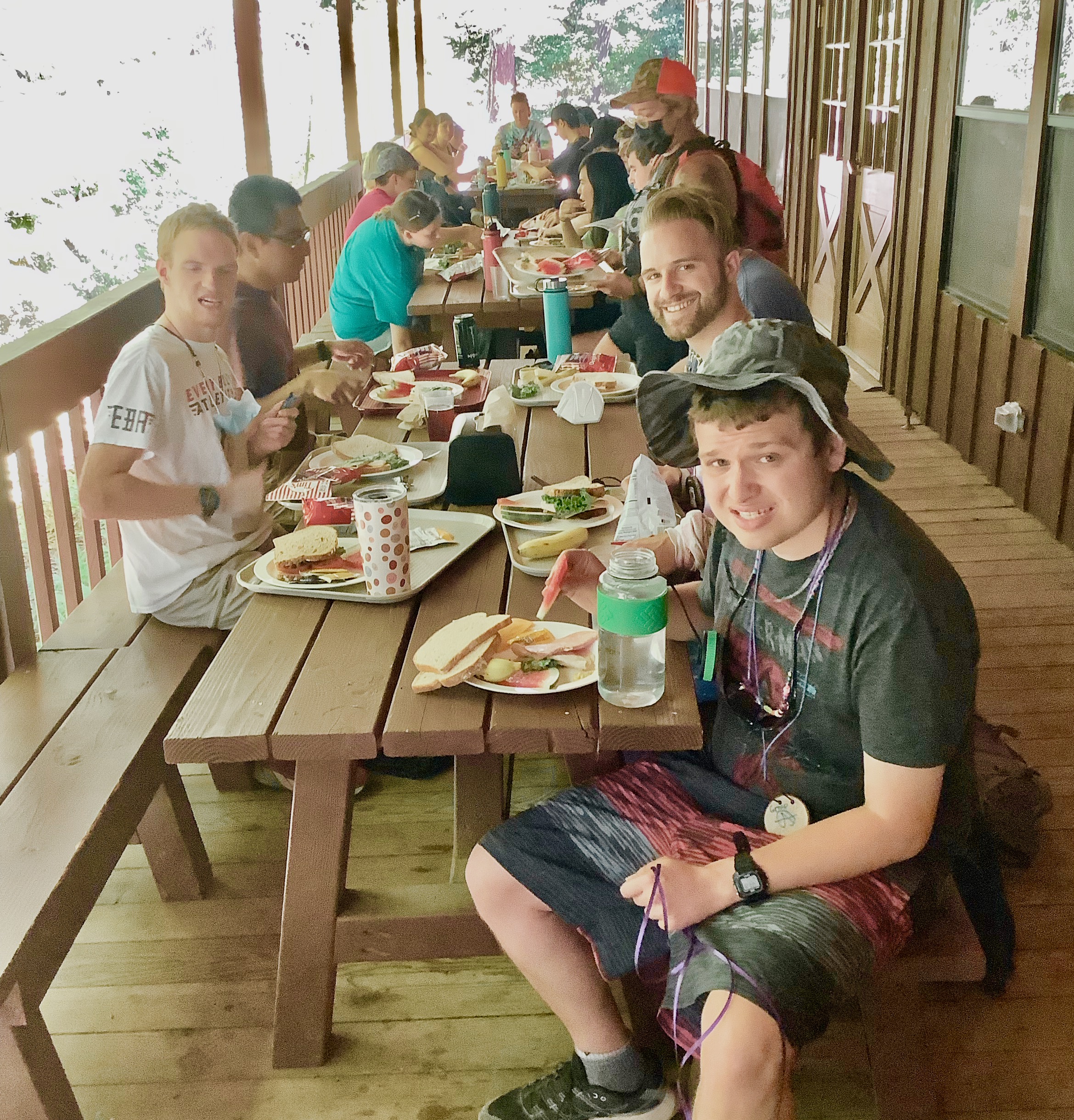+ Feeding Needs
Supporting the Feeding Needs of Our Campers

By Allison Goodwin-Crain
Meals are an important part of the camp experience. Campers look forward to sharing mealtimes with friends and socializing in Fanning Hall. The majority of our campers are able to eat regular camp meals. However, some campers have special dietary and feeding needs. To ensure these campers are being fed safely some precautions need to be taken. If you have a camper with a specialized feeding protocol, MHKC’s Feeding and Communication Specialist will help walk you through your assigned camper’s plan.
There are some common issues that may exist for this population of campers:
- They can have decreased muscle coordination and/or tone, which can cause problems with chewing or swallowing.
- They can have difficulty holding up their head or sitting up straight.
- They can have impaired mobility, which can leave them unable to properly position themselves for adequate swallowing.
- They can be taking medications that affect the muscles of the throat or mouth, which can cause delayed swallowing.
- They can have poor self-feeding skills or may be prone to food stuffing/rapid eating.
Some of the considerations are as follows:
- Proper positioning before feeding is key. Some campers who utilize wheelchairs need to be repositioned before you start feeding to ensure safe swallowing.
- Campers who are nonverbal communicate needs differently. Look for signs of discomfort and stop feeding until you can resolve the issue. Ask for help from your CS if needed.
- Watching for cues from campers is important. Cues like opening the mouth and leaning toward the bite of food are signs of interest. Turning the head away and clenching the mouth shut are signs you should try another approach.
- Listening attentively to the sounds the camper is making before, during, and after a bite of food can help you determine if proper swallowing is taking place. Improper swallowing can lead to aspiration of food items.
- Don’t forget to drink fluids! Fluid intake is an integral part of any meal time.
VERY IMPORTANT!
ASPIRATION is the inhaling of foods and/or liquids into the lungs. This is also known as “going down the wrong pipe”. Individuals with developmental disabilities are at a higher risk for DYSPHAGIA (difficult swallowing), which can lead to aspiration and choking. Food or liquids getting into the lungs can lead to infections like pneumonia, which could ultimately lead to death.
Signs and Symptoms of Aspiration:
- Choking during and/or after meals
- Coughing (DO NOT PAT THEIR BACK! That’s their body working to clear the airway.)
- Gagging
- Watery eyes
- Throat clearing
- Leakage of food/liquids from the mouth or tracheostomy tube (in the neck)
- Residue left in mouth after the swallow
- Wet/gurgling voice after the swallow
- Excess secretions
- Shortness of breath
- Fever
- Chills
- Respiratory changes or chest congestion
What to do if you see any signs of aspiration:
- Stop feeding immediately
- Do not give the camper anything to drink
- Immediately alert the nearest staff member and call for a nurse
- Tell them exactly what was fed and how much
- Try to make the camper feel safe and comforted
- If you have any thoughts/suspicions that a camper may have aspirated, immediately tell a nurse. ALWAYS err on the side of caution.
Feeding: Considerations When Helping a Camper with Meals
- Feed slowly
- Watch to make sure the camper is done swallowing each bite before offering another
- Look for “pocketing” of food in the cheeks and prompt to swallow or clear with a spoon before offering another bite
- Alternate food and liquids
- You may need to wipe food residue off after every few bites.
- If you need more strategies for safe swallowing, consult the camp SLP
Caregiver Tips:
When the camper(s) you are paired with arrive, ask the parent/guardian/caregiver questions regarding mealtime strategies. This will help reduce stress and make meals more enjoyable for both of you.
- Do they use a straw or drink from a cup?
- Do they use adaptive eating/drinking equipment?
- Can you show me the positioning you use when feeding?
- Ask about food consistencies and preferences
Special Diets:
A special diet is any diet that is different from the food being served to all other campers. Special diets may be in place due to a food allergy, intolerances, or swallowing difficulties. Our camp kitchen staff will have a list of all dietary restrictions, as will the counselors and staff. Special meals or adaptations are available to meet all campers’ nutritional needs.
Food Allergies
A food allergy is an immune system response to an ingredient that the body mistakes as harmful. Antibodies are created by the body to defend against the food allergen. Ingesting something to which you have a severe allergy can result in anaphylactic shock (the worst case scenario), hives, illness, and other difficulties. Some of the most common food allergies are peanuts, tree nuts (walnuts, almonds, and pecans), milk, eggs, soy products, wheat/gluten, fish, and shellfish.
**It is important for you to know the camper’s food allergies to ensure they do not ingest those specific food items.
Food Intolerance
This is a digestive system response to any food that irritates a person’s digestive system when they are unable to properly break down the food. Some common intolerances are lactose (found in milk and dairy products) and wheat/gluten (found in breads, cereals, and pastas). Speak with the parent/guardian/caregiver when the camper arrives about any food intolerances and how much, if any, the camper is able to tolerate. Many campers with lactose and gluten intolerance will be able to eat small amounts of these foods. Other campers may have strict dietary rules on which foods to avoid.
